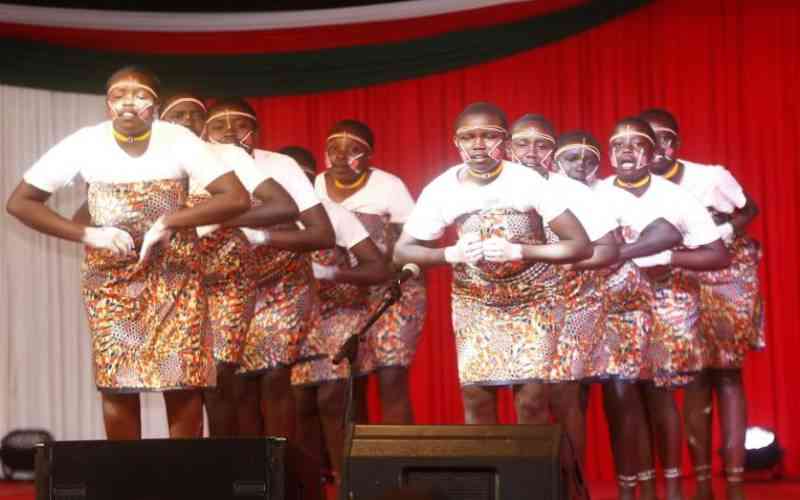In 1992, the renowned British biologist Dennis Noble famously told the world that life was a kind of music.
In the book titled ‘The Music of Life: Biology Beyond Genes, the 83-year-old cardiovascular physiologist at the University of Oxford said, “Life is a kind of music, a symphonic interplay between genes, cells, organs, body and environment.”
Noble has been praised for using literary devices to deliver complicated scientific messages. But, away from the complex scientific theories that people like Noble wrestle with, is life itself indeed a melodious symphony?
Karen Blixen says in ‘Out of Africa’, “When you have caught the music of Africa, you find that it is the same in all its elements. What I learned about the animals and the plants was useful in my dealing with the natives.”
The disturbing racist overtones aside, Blixen brings home the three-way alliance between life, music and poetry. Even when it refuses to be a beautiful symphony – such as in death and mourning – does life seem to remain musical in the troubledcacophonies, staccatos, crescendos and diminuendos of a teary season?
The three English Williams of “childhood innocence” brought home, in their poetry, the beauty of the music that is life.
William Blake (1757–1827), William Ross Wallace (1819–1881) and William Butler Yeats (1865–1939), were each fascinated with the trifecta of the musical rhythm of the innocence of childhood, the joys of motherhood and the loss of innocence in adulthood.
Lullaby-moment
They were disturbed by the corrupting influence of the world, away from the comforts and safeguards of the cradle. In this, they have helped us appreciate the rime and rhythm of this thing we call life. Yeats says in the poem titled “A Cradle Song”: The angels are stooping, above your bed: They weary of trooping with the whimpering dead. God’s laughing in heaven to see you so good; The Shining Seven are gay with His mood. I sigh that kiss you, for I must own; That I shall miss you when you have grown.
A mother’s profound love for the infant is captured in this lullaby-moment. She watches over her sleeping beauty with an angelic eye.
Our mothers would possibly wish to be permanently frozen in this state, kissing and kissing their own beautiful pigeons.
Those who have been privileged to enjoy the beauty of kissing would no doubt wish that the moment did not pass on. They would wish to be frozen in the act, the time and space.
Yet life is not like that. It must flow on, quietly like the Don. Like music, it must go through the crescendos, diminuendos and silences that give it pace and rhythm.
Yeats’s dotting mother knows that out of the ebbs and flows of life she must, someday, “lose her beautiful child to the world.” In her words, “For I must own that I shall miss you when you have grown!” Ask any parent whose children have grown up and left home.
Our parents – and our mothers especially – could, however, find comfort in knowing that the kids go out with a part of them. For, they prepare us to confront the world with all the unpredictable turns and twists in its music. Wallace wrote in 1865: “Mother’s first to guide the streamlets…. For, the hand that rocks the cradle is the hand that rules the world.” We leave home “to rule the world” in the manner that our mothers have taught us.
Stay informed. Subscribe to our newsletter
Rough vocals
For all their dovelike attention, in the end, our mothers can do little or nothing about our destiny.
The joys of motherhood sit awkwardly in the same chamber with fear, as moms watch over their sleeping beauties. Blake’s mother in “A Cradle Song” (same title as Yeats’s) reckons:
O the cunning wiles that creep
In thy little heart asleep!
When thy little heart doth wake,
Then the dreadful night shall break.
The dreadful night breaks with the loss of innocence. It is a blighted world and a scarred life. Poetry, and literature at large, only gives it expression.
Before the expression becomes musical, it must first be poetry. And before it becomes poetry, it must be lived and experienced. Music is accordingly poetry at the point where it flowers into the fullness of its beauty. Here the poem opens up like a beautiful flower. It must be sung.
We find and express the harmony of our living in our music. Hence, we have lullabies to send us to sleep. In death, we compose and sing dirges.
In wedlock, we sing melodious nuptial tunes. In war, we sing songs of courage and valour. In circumcision, we sing songs that go with the rites of passage. Order is established between ourcircumstances and their expression.
If sometimes the symphony is lost, could that too be an expression of our circumstances? What passes for music in our new age is a pathetic cacophony of instruments and rough vocals.
The masculine voices in popular music are frightfully Dracula-like and “hynaic.”
The music is composed and performed to be beastly. With few exceptions, female vocals shriek almost devilishly. In the words of the Nigerian poet Gabriel Okara of “Piano and Drums,” the musicwails at you.
Hiding our fears
“The mystic rhythm of primal youth” has given way to: “tear-furrowed concerto …coaxing diminuendo, counterpoint, crescendo. But lost in the labyrinth of its complexities, it ends in the middle of a phrase at a dagger point.”
This music speaks of a broken world afraid of itself. Like the disturbed world that we live in, our music is also troubled.
Even in the Church, the solemn harmonious melody that would say, “Be still my soul,” has given way to cacophonous staccato. We are in need to hide our fears in the loudness and chaos of ourmusic.
We want quick fixes and quick climaxes. In love, there is no time for courtship to come to full blossom and to flower into romance.
Tango comes as rape in search of rushed climaxes. It’s a raped and raping world that has lost all innocence. The music of rape tells the story. And we disguise it as rap.
- The writer is a strategic public communications adviser.
www.barrackmuluka.co.ke
 The Standard Group Plc is a
multi-media organization with investments in media platforms spanning newspaper
print operations, television, radio broadcasting, digital and online services. The
Standard Group is recognized as a leading multi-media house in Kenya with a key
influence in matters of national and international interest.
The Standard Group Plc is a
multi-media organization with investments in media platforms spanning newspaper
print operations, television, radio broadcasting, digital and online services. The
Standard Group is recognized as a leading multi-media house in Kenya with a key
influence in matters of national and international interest.
 The Standard Group Plc is a
multi-media organization with investments in media platforms spanning newspaper
print operations, television, radio broadcasting, digital and online services. The
Standard Group is recognized as a leading multi-media house in Kenya with a key
influence in matters of national and international interest.
The Standard Group Plc is a
multi-media organization with investments in media platforms spanning newspaper
print operations, television, radio broadcasting, digital and online services. The
Standard Group is recognized as a leading multi-media house in Kenya with a key
influence in matters of national and international interest.









